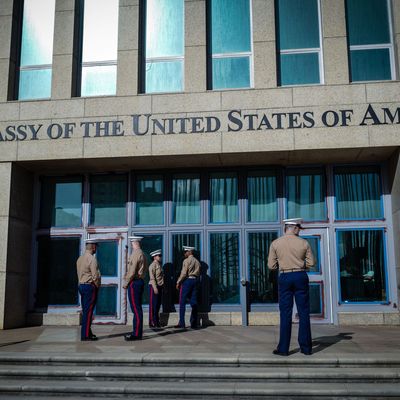
A new, comprehensive U.S. intelligence assessment of “Havana syndrome,” the mysterious slew of symptoms suffered by American diplomats around the world since 2016, found that it wasn’t caused by Russia, Cuba, or any other foreign adversary. Nor, the report says, did the ailments result from a directed energy weapon.
The conclusion of the report, first reported in the Washington Post on Wednesday, is not a shock given that no proof had ever emerged of foreign nefariousness before. But it constitutes the most authoritative word on what has become a controversial topic. And it isn’t ambiguous, per the Post:
Seven intelligence agencies participated in the review of approximately 1,000 cases of “anomalous health incidents,” the term the government uses to describe a constellation of physical symptoms including ringing in the ears followed by pressure in the head and nausea, headaches and acute discomfort.
Five of those agencies determined it was “very unlikely” that a foreign adversary was responsible for the symptoms, either as the result of purposeful actions — such as a directed energy weapon — or as the byproduct of some other activity, including electronic surveillance that unintentionally could have made people sick, the officials said. They spoke on the condition of anonymity to describe the findings of the assessment, which had not yet been made public.
The agencies couldn’t locate a consistent pattern among the cases over the years; found no evidence that Russia, Cuba, or any other foreign government knew the attacks were taking place; and concluded that several of the incidents had occurred in places where it would be next-to-impossible to position an energy-directed weapon. Some experts have deemed that directed-energy explanation implausible within the limits of current technology anyway, though an intelligence panel last year concluded that it was the most likely cause of Havana syndrome.
In a statement, CIA director Bill Burns said, “I and my leadership team stand firmly behind the work conducted and the findings.”
The trouble began in 2016, when several diplomats working at the U.S. Embassy in Havana began experiencing symptoms, like ringing in the ears and headaches, which ranged from irritating to debilitating. For some, the symptoms persisted and resulted in ongoing disabilities that left them unable to work or live as before. Soon, similar ailments spread among U.S. diplomats around the world, from Guangzhou to Vienna and even the White House. Theories proliferated about what was causing it, and a cottage industry of long-form magazine articles and podcasts has tried to solve the tantalizing mystery, to no avail.
Was it targeted energy attacks instigated by Cuba or Russia? Was it a non-state actor? Or — a theory that gained steam over the last couple of years — was Havana syndrome a psychogenic illness, meaning that the symptoms are very real, but the origins psychosomatic?
Wednesday’s report will undoubtedly strengthen that thesis, even as some sufferers, facing years of hardship, insist that they were attacked. (Whatever the cause, the U.S. government passed legislation to compensate some of those who have been experiencing symptoms.)
But the intense interest the cases have engendered in government and media probably means that we haven’t heard the last of these weird episodes.






























